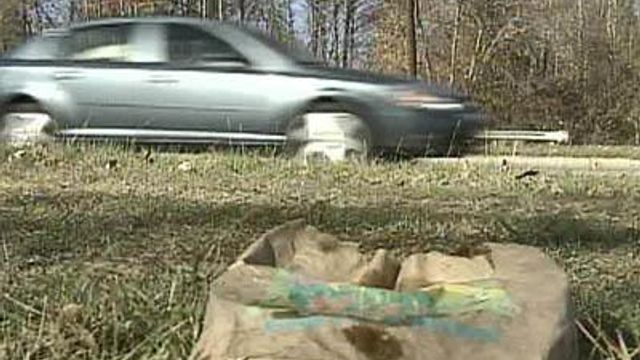Wake to Slap Civil Fines on Litterbugs
Wake County will soon begin swatting litterbugs with civil fines to try to keep area roads clean. First-time offenders would be fined $250, a second offense would lead to a $500 fine.
Posted — UpdatedThe county Board of Commissioners on Monday approved an amendment to the county's Solid Waste Ordinance that adds to the penalties for people caught littering. First-time offenders would be fined $250, a second offense would lead to a $500 fine and subsequent citations would result in $1,000 fines.
"We're a messy county," Commissioner Tony Gurley said. "I think this is a way to draw attention to the problem – it's obvious there is a problem – to begin getting citizens' help in solving this problem."
Last year, 672 criminal charges for littering were lodged in Wake County. That was by far the most in North Carolina, with Mecklenburg County ranking second with 413 littering charges.
Still, fewer than half of the Wake County charges resulted in convictions. Officials said some charges were dismissed as part of plea agreements.
County environmental officials said the civil penalties will help them enforce anti-littering regulations in cases that previously could have slipped through the cracks.
"It's another tool for law enforcement to use," said Craig Wittig, director of the county's Keep America Beautiful program.
Under the new program, the Environmental Services Department will hire off-duty deputies to patrol selected thoroughfares and issue criminal and civil citations as needed. Deputies could begin training for the program as early as next week.
County staffers also will work with a consultant to evaluate ways to improve public education about anti-littering regulations and to examine strategies used in successful programs across the Southeast.
The cost for the new program hasn't been determined, but Bessie Dunn said it would be worth the cost. She lives near a county landfill and often finds litter in her yard.
"Get a warning to the people not to throw it out. If you don't get a warning to the people, they'll still throw it out on you," Dunn said.
• Credits
Copyright 2024 by Capitol Broadcasting Company. All rights reserved. This material may not be published, broadcast, rewritten or redistributed.






